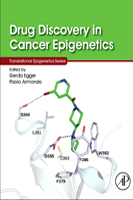Drug Discovery in Cancer Epigenetics
Edited by Gerda Egger, PhD, Clinical Institute of Pathology, Medical University of Vienna, Vienna, Austria
Paola Arimondo, PhD, Unité de Service et de Recherche CNRS-Pierre Fabre n°3388, Toulouse, France

Description
Drug Discovery in Cancer Epigenetics is a practical resource for scientists involved in the discovery, testing, and development of epigenetic cancer drugs. Epigenetic modifications can have significant implications for translational science as biomarkers for diagnosis, prognosis or therapy prediction. Most importantly, epigenetic modifications are reversible and epigenetic players are found mutated in different cancers; therefore, they provide attractive therapeutic targets. There has been great interest in developing and testing epigenetic drugs, which inhibit DNA methyltransferases, histone modifying enzymes or chromatin reader proteins. The first few drugs are already FDA-approved and have made their way into clinical settings. This book provides a comprehensive summary of the epigenetic drugs currently available and aims to increase awareness in this area to foster more rapid translation of epigenetic drugs into the clinic.
Key Features
- Highlights the potential of epigenetic alterations in cancer for drug development
- Covers the tools and methods for epigenetic drug discovery, preclinical and clinical testing, and clinical implications of epigenetic therapy
- Provides important information regarding putative epigenetic targets, epigenetic technologies, networks and consortia for epigenetic drug discovery and routes for translation
Readership
Scientists in the academic and industrial sector aiming to test and develop epigenetic cancer drugs; oncologists; geneticists; clinical researchers; clinicians interested in adopting clinical trial drugs.
Table of Contents
-
Preface
- Basic Epigenetic Mechanisms and Phenomena
- Cancer Epigenetics
- Drug Discovery Methods
- Preclinical Cancer Models with the Potential to Predict Clinical Response
- Discovery of Biomarkers for Drug Development
- Networks and Consortia for Epigenetic Drug Discovery
- DNA Methyltransferase Inhibitors
- Small Molecule Inhibitors of Histone Deacetylases and Acetyltransferases as Potential Therapeutics in Oncology
- Targeting histone methylation. The development of selective methyltransferase and demethylase inhibitors
- Bromodomains as Anti-Cancer Targets
- Epigenetic Readers Interpreting the Lysine Methylome – Biological Roles and Drug Discovery
- Non coding RNAs: Clinical and Therapeutic Applications
- Clinical Applications of Epigenetic Drugs
- Efficacy of Combined Epigenetic Therapies
- Predicting and Monitoring Responses to Epigenetic Drugs
- Episensitization: A New Word for A New Concept
- The Emerging Potential for Epigenetic Therapeutics in Non-Cancer Disorders
I. Introduction
II. Methods and Tools for Epigenetic Drug Development
III. Classes of Epigenetic Drugs
IV. Clinical Implications of Epigenetic Therapy
Available now at Store.Elsevier.com